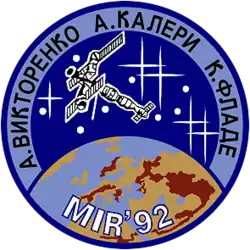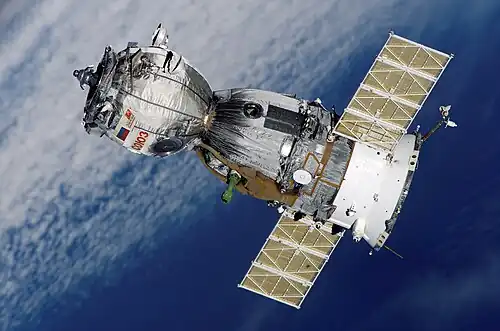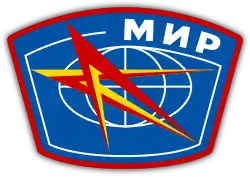Soyuz TM-14
| Operator | Rosaviakosmos |
|---|---|
| COSPAR ID | 1992-014A |
| SATCAT no. | 21908 |
| Mission duration | 145 days, 14 hours, 10 minutes, 32 seconds |
| Orbits completed | ~2,280 |
| Spacecraft properties | |
| Spacecraft | Soyuz 7K-STM No. 64 |
| Spacecraft type | Soyuz-TM |
| Manufacturer | NPO Energia |
| Launch mass | 7,150 kilograms (15,760 lb) |
| Crew | |
| Crew size | 3 |
| Members | Aleksandr Viktorenko Aleksandr Kaleri |
| Launching | Klaus-Dietrich Flade |
| Landing | Michel Tognini |
| Callsign | Ви́тязь (Vityaz' – Knight) |
| Start of mission | |
| Launch date | 17 March 1992, 10:54:30 UTC |
| Rocket | Soyuz-U2 |
| End of mission | |
| Landing date | 10 August 1992, 01:05:02 UTC |
| Landing site | 136 kilometres (85 mi) SE of Dzhezkazgan |
| Orbital parameters | |
| Reference system | Geocentric |
| Regime | Low Earth |
| Perigee altitude | 373 kilometres (232 mi) |
| Apogee altitude | 394 kilometres (245 mi) |
| Inclination | 51.6 degrees |
| Period | 92.2 minutes |
| Docking with Mir | |
| Docking date | 19 March 1992, 12:32:50 UTC |
| Undocking date | 9 August 1992, 21:46:47 UTC |

Soyuz programme (Crewed missions) | |
Soyuz TM-14 was the 14th expedition to the Mir space station.[1] It included an astronaut from Germany, and was the first Russian Soyuz mission after the collapse of the Soviet Union.
Crew
| Position | Launching crew | Landing crew |
|---|---|---|
| Commander | Third spaceflight | |
| Flight Engineer | First spaceflight | |
| Research Cosmonaut | First spaceflight |
First spaceflight |
Mission highlights
Klaus Dietrich Flade became the second German to visit a space station when he reached Mir with the Vityaz crew. The first was Sigmund Jähn of East Germany, who visited Salyut 6 in 1978. Flade conducted 14 German experiments as part of Germany's preparation for participation in the Freedom and Columbus space station projects.[2]
Suffered a landing system malfunction, causing its descent module to turn over. It came to rest upside down, trapping its occupants inside until it could be righted.
References
- ^ The full mission report is available here: http://www.spacefacts.de/mission/english/soyuz-TM14.htm
- ^ Schmemann, Serge (1992-03-26). "After 313 Days in Space, It's a Trip to a New World". The New York Times. ISSN 0362-4331. Retrieved 2025-07-20.

